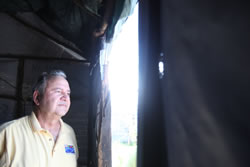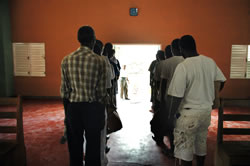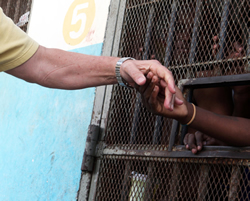Deadly Prison Fire Highlights Need for Food For The Poor Prison Ministry Nonviolent Offenders to be Freed
COCONUT CREEK, Fla. (April 4, 2012) — Food For The Poor has released 78 nonviolent offenders in the Dominican Republic (6), Guyana (19), Haiti (15), Honduras (8) and Jamaica (30) in time to spend Easter Holy Week with their families. These prisoners were incarcerated due to their inability to pay the required fines, even though the amounts in some cases are minimal. Sometimes by the time they are tried, they have spent years longer in jail than their prison sentence requires.
 | |
Robin Mahfood, President/CEO of FFP, examines the conditions of a dilapidated shack in Haiti. He often visits inmates while in Haiti. |
Since the inception of Food For The Poor’s Prison Ministry Program in 1998, Food For The Poor has assisted in freeing, training and reintroducing prisoners back into the community as productive citizens.
“Prison conditions and poverty are drastically worse in developing countries than they are in the United States,” said Robin Mahfood, President/CEO of Food For The Poor. “Overcrowded prisons are common, and perpetuate the spread of disease and violence. Through Food For The Poor’s Prison Ministry program, we want to help nonviolent offenders make a fresh start.”
Factors cited in the recent Honduras prison fire were severe overcrowding and an unstable environment. Prisoners were reported to be suffering from malnutrition and a lack of adequate sanitation. It has also been reported that inmates with mental illnesses, as well as those with tuberculosis and other infectious diseases, are routinely held among the general prison population. Similarly, the potential spread of cholera in Haiti prisons remains a concern.
Most of the 358 inmates who were burned alive in February’s fire at the Comayagua prison in Honduras had never been charged or convicted, according to reports from The Associated Press.
“This case is neither the only one nor the first in the world,” said Cardinal Oscar Andrés Rodríguez Maradiaga, Archbishop of Tegucigalpa, Honduras, and a member of Food For The Poor’s Board of Directors. “The humane care of prisoners is the most revealing social indicator that can describe a complete society. By promoting the process of pardons, and the acceleration of trials, prisons can be less crowded and transform detainees into good citizens.”
 | |
In anticipation of Christmas 2011, Food For The Poor-Jamaica released 22 prisoners in time to spend Christmas with their families. | |
On March 2, thanks to the generosity of Food For The Poor donors, eight nonviolent offenders at Pastoral Penitenciaria in San Pedro Sula, Honduras, had their petty fines paid, so they could be reunited with their families.
Last month, Food For The Poor donors served warm meals to approximately 560 prisoners in Cap-Haitien, Haiti. The barracks were so congested, men were forced to sit in rows on the floor and hug their knees close to their chests – taking turns to stand, and stretch out their limbs.
Most of the nonviolent offenders to be released from prisons in Haiti were jailed because they stole food to feed their starving families. Last year, one man released during Easter’s Holy Week had been caught stealing food in the marketplace and had already served a two-month prison sentence because he was unable to pay the 75 cent fine.
The nonviolent offenders, renewed with hope, are led outside the prison gate. Food For The Poor representatives and partners pray with them for God’s forgiveness and blessing. Just prior to their release, they are fed a warm meal, given tools, a small stipend and groceries to take home to their families. Prison authorities have found Food For The Poor’s Prison Ministry Program to be so successful that they have implemented a similar program themselves. Some prisons now offer inmates jobs in the prison where they are held so that they can earn money to pay off their fines.
Twice a year – the week of Christmas and during Easter’s Holy Week – the Food For The Poor Prison Ministry Program releases inmates who have committed minor offenses. The ministry is based on the scripture, “…I was in prison and you visited me,” (Matthew 25: 31-46).
 | |
Jim McDaniel, a Church of the Nativity parishioner and FFP staff member, extends a hand to an inmate in Cap-Haitien’s prison. |
To support Food For The Poor’s Prison Ministry Program, checks payable to Food For The Poor can be mailed to 6401 Lyons Road, Coconut Creek, Fla. 33073. Please include reference number “SC# 74122″ to ensure your donation is accurately routed.
Food For The Poor, named by The Chronicle of Philanthropy as the largest international relief and development organization in the nation, does much more than feed millions of the hungry poor in 17 countries of the Caribbean and Latin America. This interdenominational Christian ministry provides emergency relief assistance, clean water, medicines, educational materials, homes, support for orphans and the aged, skills training and micro-enterprise development assistance, with more than 96 percent of all donations going directly to programs that help the poor.
For more information, please visit www.FoodForThePoor.org.
Contact:
Jennifer Leigh Oates
Food For The Poor
Public Relations
954-427-2222 x 6054
[email protected]


